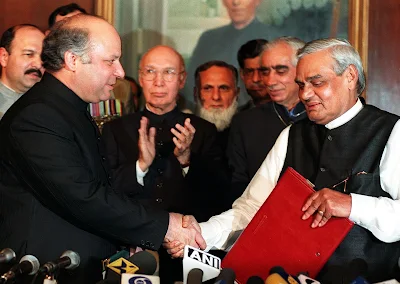Asked what he believes is the reason for his ouster from public office, Mr Sharif did not reply directly but steered the conversation towards foreign policy and national security. “We have isolated ourselves. Despite giving sacrifices, our narrative is not being accepted. Afghanistan’s narrative is being accepted, but ours is not. We must look into it.” He continued: “Militant organisations are active. Call them non-state actors, should we allow them to cross the border and kill 150 people in Mumbai? Explain it to me. Why can’t we complete the trial?” — a reference to the Mumbai attacks-related trials which have stalled in a Rawalpindi anti-terrorism court. “It’s absolutely unacceptable. This is exactly what we are struggling for. President Putin has said it. President Xi has said it,” Mr Sharif said. “We could have already been at seven per cent growth (in GDP), but we are not.” ------------------------------------ (October 06, 2016) ISLAMABAD: In a blunt, orchestrated and unprecedented warning, the civilian government has informed the military leadership of a growing international isolation of Pakistan and sought consensus on several key actions by the state. Second, Prime Minister Nawaz Sharif has directed that fresh attempts be made to conclude the Pathankot investigation and restart the stalled Mumbai attacks-related trials in a Rawalpindi antiterrorism court. Those decisions, taken after an extraordinary verbal confrontation between Punjab Chief Minister Shahbaz Sharif and the ISI DG, appear to indicate a high-stakes new approach by the PML-N government. On the US, Mr Chaudhry said that relations have deteriorated and will likely further deteriorate because of the American demand that action be taken against the Haqqani network. On India, Mr Chaudhry stated that the completion of the Pathankot investigation and some visible action against Jaish-i-Mohammad were the principal demands. Then, to a hushed but surprised room, Mr Chaudhry suggested that while China has reiterated its support for Pakistan, it too has indicated a preference for a change in course by Pakistan. Specifically, while Chinese authorities have conveyed their willingness to keep putting on technical hold a UN ban on Jaish-i-Mohammad leader Masood Azhar, they have questioned the logic of doing so repeatedly. At that point came the stunning and unexpectedly bold intervention by Punjab Chief Minister Shahbaz Sharif. Addressing Gen Akhtar, the younger Sharif complained that whenever action has been taken against certain groups by civilian authorities, the security establishment has worked behind the scenes to set the arrested free. Astounded onlookers describe a stunned room that was immediately aware of the extraordinary, unprecedented nature of the exchange.
ISLAMABAD, Aug 5: The Pakistan Muslim League (Nawaz) on Saturday claimed that the Indian government knew about the Kargil operation plan in June 1998, about 11 months before it was launched, and it had made preparations to turn the battlefield into a deadly trap for Kashmiri freedom fighters and Pakistan. The claim was made by the PML-N in a 100-page ‘white paper’ on the Kargil operation titled ‘Kargil adventurism: another huge defeat after Dhaka Fall, who is responsible?’ released by its joint secretary Siddiqul Farooq at a news conference here on Saturday. The PML-N leader said it was necessary to constitute a high-powered commission on Kargil debacle that should submit its findings to parliament within six months, adding that it was a national demand. Mr Farooq said a detailed report on the operation had been submitted by the directors of the Indian Intelligence Bureau to the then prime minister, Atal Behari Vajpayee, the interior minister and the DG Military Operations. However, he said, a “naive military adventurer, Gen Musharraf,” launched the operation without proper planning on May 8, 1999 causing loss of life of 3,000 officers and Jawans of the Northern Light Infantry (NLI) and Kashmiri Mujahideen, while India suffered loss of 474 soldiers.



No comments:
Post a Comment